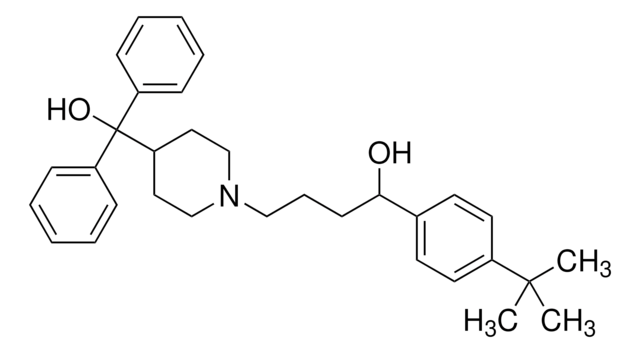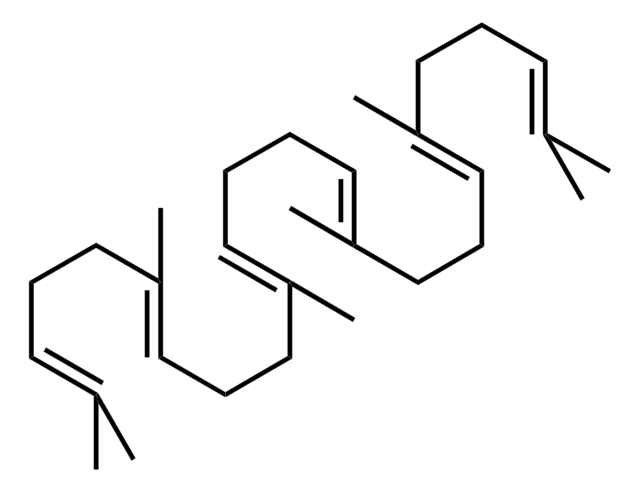C1758
Coconut oil from Cocos nucifera
low-melting solid
Sinónimos:
Coconut fat, Copra oil
Iniciar sesiónpara Ver la Fijación de precios por contrato y de la organización
About This Item
Productos recomendados
origen biológico
Cocos nucifera
Nivel de calidad
Formulario
low-melting solid
mp
23-27 °C
tipo de lípido
oils
Condiciones de envío
ambient
temp. de almacenamiento
room temp
¿Está buscando productos similares? Visita Guía de comparación de productos
Aplicación
- Linseed, Baru, and Coconut Oils: NMR-Based Metabolomics, Leukocyte Infiltration Potential In Vivo, and Their Oil Characterization. Are There Still Controversies: This research utilizes NMR-based metabolomics to explore the biochemical properties of various oils, including coconut oil, and investigates their potential for leukocyte infiltration in vivo. The findings contribute to understanding the health implications and biochemical interactions of coconut oil (Figueiredo et al., 2022).
Forma física
Usually a solid at room temperature
Código de clase de almacenamiento
11 - Combustible Solids
Clase de riesgo para el agua (WGK)
WGK 1
Punto de inflamabilidad (°F)
>235.4 °F - closed cup
Punto de inflamabilidad (°C)
> 113 °C - closed cup
Equipo de protección personal
Eyeshields, Gloves, type N95 (US)
Elija entre una de las versiones más recientes:
¿Ya tiene este producto?
Encuentre la documentación para los productos que ha comprado recientemente en la Biblioteca de documentos.
Los clientes también vieron
Young Taek Oh et al.
Physiology & behavior, 167, 194-201 (2016-10-25)
Previous rodent studies showed that when injected into the brain, free fatty acids (FFAs) reduced food intake in an oleate-specific manner. The present study was performed to test whether food intake is regulated by circulating FFAs in an oleate-specific manner.
Jingcan Sun et al.
Food chemistry, 141(3), 2828-2832 (2013-07-23)
Ester synthesis was carried out in a solvent-free system of lipase, coconut oil and ethanol or fusel alcohols to ascertain the reaction mechanism. During ester formation, octanoic and decanoic acids increased initially and then decreased gradually, indicating that ester production
Xuezhi Ding et al.
Tropical animal health and production, 44(7), 1541-1545 (2012-03-01)
The objective was to evaluate the effect of dietary coconut oil on methane (CH(4)) emissions and the microbial community in Tibetan sheep. Twelve animals were assigned to receive either a control diet (oaten hay) or a mixture diet containing concentrate
C Reveneau et al.
Journal of dairy science, 95(4), 2061-2069 (2012-03-31)
Feeding animal-vegetable (AV) fat or medium-chain fatty acids (FA) to dairy cows can decrease ruminal protozoal counts. However, combining moderate to large amounts of AV fat with monensin (tradename: Rumensin, R) could increase the risk for milk fat depression (MFD)
M Hollmann et al.
Journal of dairy science, 95(5), 2602-2615 (2012-05-01)
To determine if dietary medium-chain fatty acids (FA; C(8) to C(14)) may mitigate enteric methane emissions, 24 cows were blocked by body size (n=2) and randomly assigned to 1 sequence of dietary treatments. Diets were fed for 35 d each
Nuestro equipo de científicos tiene experiencia en todas las áreas de investigación: Ciencias de la vida, Ciencia de los materiales, Síntesis química, Cromatografía, Analítica y muchas otras.
Póngase en contacto con el Servicio técnico








